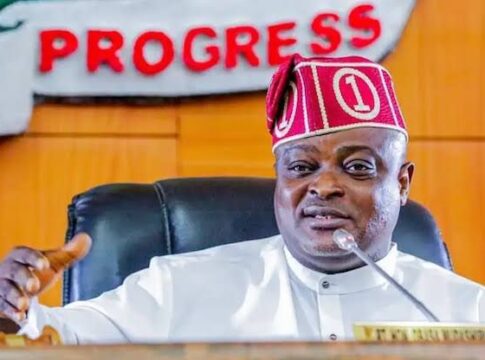The Lagos State House of Assembly has impeached its Speaker, Mudashiru Obasa, citing allegations of gross misconduct and abuse of office. The decision, supported by 90% of lawmakers, marks a dramatic end to Obasa’s tenure as speaker. He has been replaced by his deputy, Mojisola Meranda, who now makes history as the first female speaker of the Lagos Assembly.
Obasa’s impeachment, according to political observers, stems from his alleged ambition to succeed Governor Babajide Sanwo-Olu in 2027. Reports suggest that his efforts to establish grassroots structures, branded as the Obasa Support Group, ruffled feathers within the ruling All Progressives Congress (APC).
According to a source close to the matter disclosed, “Obasa’s activities across Lagos raised concerns within the party. His proposed bill to empower the Assembly to remove LASIEC leadership without executive consent was the last straw.”
Tensions with Governor Sanwo-Olu and GAC
Obasa’s impeachment also highlights ongoing tensions with Governor Sanwo-Olu and the party’s apex leadership, the Governor’s Advisory Council (GAC). His alleged attempts to pressure the governor into signing controversial bills reportedly prompted GAC intervention.
“His attitude towards the governor was unacceptable,” a party insider revealed. “President Tinubu’s meeting with Obasa sealed his fate.”
Political commentator Dayo Kayode in an interview with a local newspaper described the move as “a calculated strategy to consolidate power ahead of 2027.”
Allegations of Corruption
Obasa’s impeachment comes on the heels of corruption allegations, including a petition filed with the Economic and Financial Crimes Commission (EFCC). The petition accused Obasa of allocating ₦17 billion for a gate project at the Assembly.
Obasa denied the claims, calling them baseless. “How could I spend ₦17 billion on a gate when the House’s budget doesn’t allow for such? These accusations are politically motivated.”
A Bitter Political Feud
Tensions between Obasa and Sanwo-Olu escalated after the Assembly rejected some of the governor’s commissioner nominees in 2023, citing their lack of electoral value. Political insiders believe this was part of a broader power tussle, with Obasa’s rumored governorship ambitions at its core.
Despite publicly denying any plans to run for governor, Obasa’s political moves fueled speculation. “I have only worked to strengthen the APC in Lagos,” he said during a recent budget session.
Leadership Transition
With Mojisola Meranda now at the helm, many hope for stability in the Assembly. Observers see her appointment as a strategic move to restore unity within the APC and align the Assembly with the party’s broader goals.
Obasa, first elected in 2007, had served as speaker since 2015. His impeachment reveals the delicate balance of power within Lagos politics, where ambition and loyalty often clash. “It’s all part of the political chess game for 2027,” Kayode concluded.




